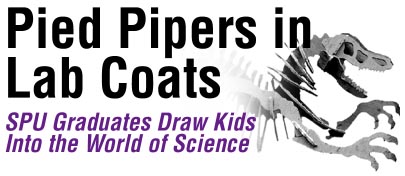Photos by Jimi Lott

They are Pied Pipers in lab coats who were educated at Seattle Pacific University. Last year named two of Greater Seattle's top 10 teachers by The Seattle Times, Brad Proffitt completed initial teacher certification at SPU in 1995, and Laurie Greco completed master's degree teacher certification at SPU in 1994.
As gratifying as the public attention resulting from the Times award was, for Proffitt and Greco the real satisfaction comes in unlocking life's most intricate mysteries with their students.
"Brad is particularly adept at hands-on, minds-on discovery activities that initiate and guide learning," says Ray Myers, Seattle Pacific professor of science education. "Laurie involves her students in original research and links their learning to the reality of their everyday lives."
Myers works with SPU science faculty members to instill in each science education student 12 characteristics essential to a successful science teacher. The goal is to graduate science teachers who are relevant, focused and passionate explorers of the natural world, and who will significantly raise the level of science literacy in their communities.
Proffitt and Greco have gone above and beyond. They're colorful nonconformists, able to perform a kind of alchemy that makes eager explorers of once science-phobic students. How do they do it?

Madrona teacher Brad Proffitt rivets student attention.
Madrona School, Edmonds, Washington
It's no easy task to build life-sized models of skeletons of a tyrannosaurus rex and a velociraptor, then bury them three feet in the ground. But the man at the controls of the backhoe was none other than K6 science teacher Brad Proffitt, who led students -- tools and notebooks in hand -- on an authentic dig to uncover the "distant" past.
It's the Proffitt modus operandi. His students are "impressionable sponges" and it's his job to fill them up.
For a unit on microbiology, he let them make and consume a batch of root beer. (The sauerkraut wasn't as popular.)
For an examination of space, Proffitt built a shuttle command center in the classroom. "Some of you may take a trip to Mars one day," he told them. Many heads nodded.
"My professors at Seattle Pacific emphasized that for a child to retain most of what he or she is taught, the teacher must engage all of that child's intelligence," says Proffitt.
Inevitably, any examination of the mechanics of life leads to discussions of the manipulation of life. Proffitt listens carefully to students, and talks with them about how scientists can help solve society's problems through ethical choices made on the basis of principle and virtue.

In the lab, Eastside's Laurie Greco looks for the miraculous.
Eastside Catholic High School, Bellevue, Washington
The secretary at Eastside Catholic High School recoiled from the package marked "Live Animals." But she figured it was just Laurie Greco's doing. Sure enough. When notified, Greco quickly retrieved her new supply of freshwater snails.
And who else but Greco could be found at midnight floating sharks in the school swimming pool in preparation for the next day's lesson in dissection?
Guilty again. Herself educated in the academically rigorous environment of a Jesuit high school, Greco ranks Eastside Catholic high in intellectual challenge. She calls it "a stimulating place with a real sense of community."
Which was something she also found at Seattle Pacific when taking instruction in teaching methods from Ray Myers. "He made us be thoughtful about our curriculum. And Bruce Congdon's class in ecology stressed the importance of the big picture. That's especially valuable when your focus is at the molecular level."
The monetary award she received from the Times honor helped start her own molecular biology equipment set with which her class has conducted a DNA analysis of the genetic sequence for deafness.
"I'm really not a lab rat," Greco asserts. "I like to read and hike and run. But my goal is that no student should leave my class without an appreciation for science.
"Life is such a miracle. God is behind it all. I hope to help my students develop their values and to teach them an ethical decision-making model they can use."
![]()

| Please read our
disclaimer.
Send any questions, comments or correspondence about Response to
jgilnett@spu.edu or call 206-281-2051. Copyright © 1999 University Communications, Seattle Pacific University.
Seattle Pacific University |